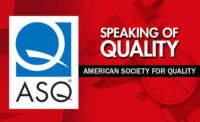Speaking of Quality | Mark Durivage
Competence, Awareness, and Training – Oh My!
Consider preparing the workforce today for the challenges of tomorrow.

Most ISO standards and Food and Drug Administration (FDA) regulations for quality management systems (QMS) have requirements for competence, awareness, and training of employees and individuals under the organization’s control.
ISO 9000-2015 Quality management systems - Fundamentals and vocabulary defines competence as the ability to apply knowledge and skills to achieve intended results and further explains that a QMS is most effective when all employees understand and apply the skills, training, education, and experience needed to perform their roles and responsibilities.
With the ever-increasing complexity involved with the provision of products and services, the demand for competent workers will undoubtedly increase. ISO 9001-2015 Quality management systems – Requirements requires the organization to determine the necessary competence and take action to acquire competence, evaluate the effectiveness of the actions taken to acquire competence, and retain documented information as evidence of competence.
Competence can be attained through a combination of education, training, or experience. Education is the systematic process of learning that develops a sense of judgment and reasoning. Training is the process of conveying a special skill or behavior. Experience is practical knowledge or skills resulting from observation and participation.
The demand for competent workers will undoubtedly increase.
ISO 9001:2015 clause 7.2 Competence, states, The organization shall:
- determine the necessary competence of person(s) doing work under its control that affects the performance and effectiveness of the quality management system;
- ensure that these persons are competent on the basis of appropriate education, training, or experience;
- where applicable, take actions to acquire the necessary competence, and evaluate the effectiveness of the actions taken;
- retain appropriate documented information as evidence of competence.
Some commonly observed issues with competency during internal, supplier, and regulatory audits include:
- Reading standard operating procedures and work instructions to address the requirement.
- The person has 20 years of experience, or do they have one year of experience twenty times?
- The individual has a certification for a relevant standard that has expired.
- The documented work experience and/or education do not match the minimum requirements for the position.
To avoid audit competence-related audit findings, one of the best and most cost-effective ways to demonstrate employee competency is through attaining and maintaining one of the eighteen currently available ASQ certifications. ASQ certifications have requirements including a combination of related work experience and academic credentials, professionalism, and successful completion of a standardized exam. ASQ certification provides peer recognition that an individual has demonstrated proficiency and comprehension of a quality scope.
ASQ certifications are based upon a body of knowledge (BOK) developed using a job analysis survey developed by survey expert and an advisory committee comprised of industry experts. The Job Analysis Advisory Committee determines the typical job responsibilities and the knowledge required related to the BOK.
After the job analysis is complete, the BOK Committee comprised of twelve subject matter experts transforms the outcomes of job analysis into logical categories which are then used to develop test questions for the certification exam. Additionally, the BOK Committee determines the number of questions in each topic area, of the BOK based on the importance of the topic, as well as the level of cognitive complexity based on Bloom’s Taxonomy of Learning (remember, understand, apply, analyze, evaluate, and create) of the testable material.
Once the BOK is complete, an Item Writing Committee which is comprised of twelve subject matter experts is tasked with writing testable questions for each area of the BOK to the proper level of cognitive complexity. An additional Item Review Committee comprised of twelve subject matter experts then review the questions for accuracy, clarity, appropriateness, and variety.
The last review is performed by the Exam Review Committee which is comprised of twelve subject matter experts. The Exam Review Committee take the exam before its formal administration.
Once a certification test has been passed, 18 recertification units (RUs) are required every three years to renew the certification.
ASQ certifications can help the organization become and remain compliant with ISO standards and Food and Drug Administration (FDA) Regulations requirements for competence by:
- requiring an applicable certification related to the functional job role.
- ASQ certifications through their development process of using subject matter experts demonstrate competence for individuals passing the exam.
- organizations can provide opportunities for individuals to take ASQ certification preparation courses to enable them to prepare for certification exams.
- a copy of a current ASQ certification in the employee training file is a great way to provide objective evidence of competence to auditors and inspectors.
ASQ certifications can be an integral part for demonstrating competency and avoiding audit and regulatory inspection findings. Consider preparing the workforce today for the challenges of tomorrow!
Looking for a reprint of this article?
From high-res PDFs to custom plaques, order your copy today!






